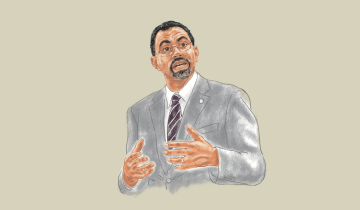In a report by 12 diversity, equity and inclusion (DEI) scholars and respected experts—each professor a senior member of their faculty and leading national scholar in their field—rebuked the Mar. 7 Subcommittee on Higher Education and Workforce Development hearing about DEI on college campuses.
Led by the USC Race and Equity Center director Shaun Harper, the report, “Truths about DEI on College Campuses,” highlights the misinformation that was spread throughout the hearing, explains how attacks on DEI efforts threatens U.S. democracy and provides evidence-based research to correct the record and highlight the reality and benefits of DEI on college campuses.
“This important new report is just one additional way our center is leveraging its research, resources, reputation and networks to fight back against those who are aiming to further divide Americans and ultimately destroy our democracy,” said Harper.
Key DEI facts offered in the report:
| Myth | Facts |
| DEI initiatives are divisive. | DEI initiatives aim to bring students and employees together to learn from each other’s differences and to co-create inclusive campus environments. |
| Too much money is spent on DEI initiatives. | Most DEI initiatives have been understaffed and underfunded since their inception. In addition, they account for a small fraction of budgets at the overwhelming majority of institutions. |
| DEI and Critical Race Theory (CRT) are synonymous. | They are not. Very few students are ever introduced to CRT in courses or in DEI programs offered outside of classrooms. |
| DEI programs poison campus environments. | No credible study has determined this. However, decades of research has concluded that sexism, sexual harassment, gendered pay inequities, racism, homophobia, transphobia, classism, sizeism, Antisemitism, Islamophobia and other forms of discrimination and harassment are harmful to students and employees. These are among the numerous problems that most DEI initiatives aim to fix. |
For the complete list of DEI myths versus facts, visit “Truths about DEI on College Campuses.”
In addition to Harper, contributing scholars featured in the report include:
- Mitchell J. Chang PhD, professor of education and Asian American Studies at the University of California, Los Angeles
- Eddie R. Cole PhD, associate professor of education and history at the University of California, Los Angeles
- Lori Patton Davis PhD, professor of education at The Ohio State University
- Liliana M. Garces EdD, W. K. Kellogg Professor in the College of Education at the University of Texas at Austin
- Joy Gaston Gayles PhD, Alumni Association Distinguished Graduate Professor and head of the Educational Leadership, Policy and Human Development Department at North Carolina State University
- Toby S. Jenkins PhD, professor in the College of Education at the University of South Carolina
- Walter M. Kimbrough PhD, executive in residence at the USC Race and Equity Center
- Julie J. Park PhD, associate professor in the College of Education at the University of Maryland
- Victor B. Sáenz PhD, L. D. Haskew Centennial Professor and associate dean for Student Success, Community Engagement, and Administration in the College of Education at the University of Texas at Austin
- Shawn M. Smith MD, physician at the Ann & Robert H. Lurie Children’s Hospital of Chicago
- Lisa Wolf-Wendel PhD, Roy A. Roberts Distinguished Professor of Higher Education at the University of Kansas
“We invite Americans to use this document to dispel ridiculous, unsubstantiated claims about DEI. We hope these truths are helpful; politicized lies are not,” added Harper.





